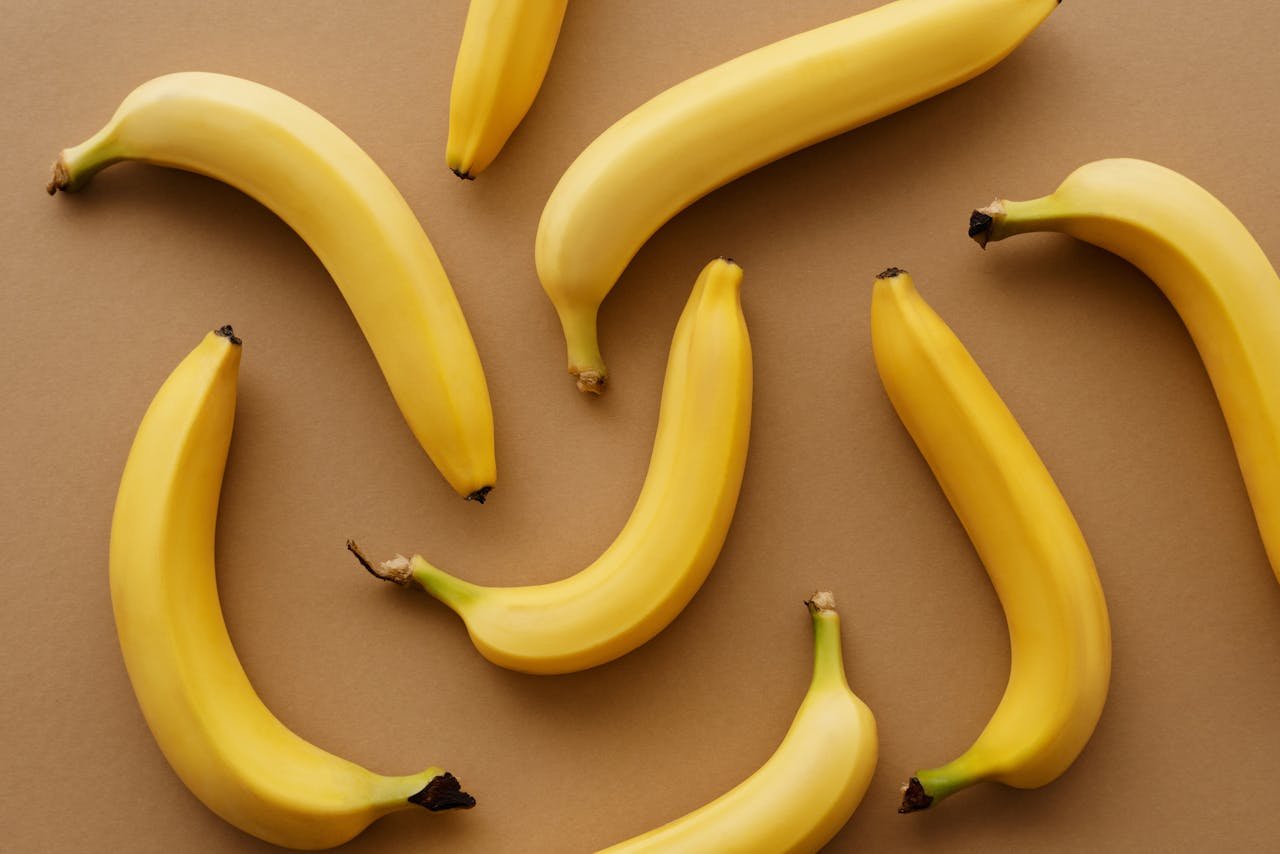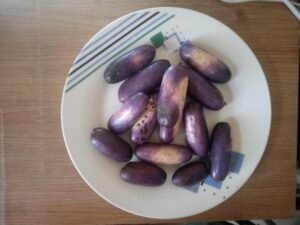Banana
Bananas belong to the Musa family. They are native to Southeast Asia and are grown in warmer climates. Their color usually ranges from green, red to yellow.
Bananas are a type of fruit that grow on plants called banana plants. They are typically elongated and curved, with a soft, edible peel that ranges in color from green to yellow to brown, depending on their ripeness.
Bananas are known for their sweet taste and are enjoyed by many people around the world. They are among the most important food crops in the world. They are a good source of various nutrients such as potassium, vitamin C, and dietary fiber, making them a popular and nutritious snack.
7 Most Common Types of Bananas Fruits?
There are many different types of bananas available worldwide, each with its own unique characteristics and flavors. Here are some commonly known varieties of bananas:
1. Cavendish
Cavendish bananas are the most common and widely available variety. They are known for their elongated shape, slightly curved appearance, and yellow skin. Cavendish bananas have a mild and sweet flavor.
2. Plantain
Plantains are a staple food in many tropical countries. Unlike sweet bananas, plantains are starchy and are usually cooked before eating. They have a green peel that turns yellow or black as they ripen. Plantains are commonly used in dishes such as fried plantains or plantain chips.
3. Lady Finger (Sugar Banana or Baby Banana)
Lady Finger bananas are smaller in size compared to traditional
4. Red Banana
Red bananas, as the name suggests, have a reddish-purple skin when fully ripe. They are shorter and plumper than the traditional Cavendish bananas. Red bananas have a sweet flavor with undertones of raspberry or strawberry.
5. Burro Banana
Burro bananas have a blocky and stubby appearance compared to the traditional elongated bananas. They have a thick, yellow peel that turns black as they ripen. Burro bananas have a tangy and lemony flavor with hints of sweetness.
6. Manzano Banana
Manzano bananas, also known as apple bananas, gained their name due to their apple-like flavor. They have a sweet, tangy taste and can be recognized by their small size, plump shape, and yellow skin with black spots.
7. Cavendish Banana
They have a thin, delicate peel that is easy to remove. Lady Finger bananas are sweeter than regular bananas, with a creamy and custard-like texture.
These are just a few examples of the many banana varieties available globally. It’s worth noting that banana varieties can vary depending on the region, so there may be local variations not listed here.
Nutritional Facts of Banana Fruit
Bananas are rich in nutrients and offer the following approximate
Nutritional values per 100 grams of the banana contains:
- Calories: 96
- Carbohydrates: 22.0 grams
- Sugars: 17.2 grams
- Dietary Fiber: 2.6 grams
- Protein: 1.0 gram
- Fat: 0.2 grams
- Potassium: 358 milligrams
- Vitamin C: 10.3 milligrams
- Vitamin B6: 0.4 milligrams
- Vitamin A: 64 international units
- Magnesium: 27 milligrams
One medium banana contains:
- Calories: 89
- Fat: 0.3 grams
- Protein: 1.1 grams
- Carbs: 29 grams
- Sugar: 12.2 grams
- Fiber: 3 grams
- Vitamin C: 10.3 mg 12% of the Daily Value (DV)
- Beta carotene: 30.7 mcg
- Alpha carotene: 29.5 mcg
- Riboflavin: 7% of the DV
- Folate: 23.6 mcg 6% of the DV
- Niacin: 5% of the DV
- Copper: 11% of the DV
- Potassium: 10% of the DV
- Magnesium: 31.9 mg 8% of the DV
- Phosphorus: 26 mg
- Selenium: 1.9 mcg
- Choline: 11.6 mg
Other plant compounds
- Dopamine
- Catechin
Please note that these values can vary slightly based on factors such as the size and ripeness of the banana.
Health Benefits of Banana
Bananas are a nutritious fruit that offer various health benefits. They are a good source of potassium, which helps maintain heart health and proper muscle function. They also contain dietary fiber that supports digestive health, and vitamin C which boosts the immune system. Additionally, bananas provide energy due to their natural sugars and are easy to digest, making them a great snack option. Here are some benefits of consuming bananas;
1. Nutrient-rich
Bananas are packed with essential nutrients like vitamins (such as vitamin C, vitamin B6), minerals (such as potassium and magnesium), dietary fiber, and antioxidants. These nutrients are important for the overall health and functioning of the body.
2. Improve Blood Sugar Levels
Bananas are great source of soluble fiber. During digestion, the soluble fiber dissolves in liquid to form a gel. Unripe (green) bananas contains a resistant starch and pectin, which are types of dietary fiber that the body does not digest.
The presence of these fibers in banana may help moderate your blood sugar levels after meals and regulate your appetite by making you feel full for longer.
This implies that despite the high level of carbohydrate in bananas, it may not cause major spikes in blood sugar levels in people who don’t have diabetes.
Although, for people who have diabetes, eating a large portion in one sitting may cause blood sugar levels to rise too high, so it’s best to stick to one banana at a time.
3. Energy booster
Bananas are a great source of natural sugars, carbohydrates, and fiber, which can provide a quick and sustained energy boost. They make for an excellent pre-workout snack or a midday energy booster.
The presence of Resistant starch and pectins in unripe (green) bananas can act as prebiotic nutrients, supporting the growth of beneficial gut bacteria. These fibers are fermented by beneficial gut bacteria that form butyrate, a short-chain fatty acid that promotes gut.
4. Improved digestion
Bananas contain dietary fiber that aids in proper digestion and helps prevent constipation by promoting regular bowel movements.
The fiber content also supports the growth of healthy gut bacteria, improving gut health. The dietary fiber may help keep you full by adding bulk to your digestive system, thereby slowing digestion.
5. Cancer
Bananas contain certain compounds that have been studied for their potential cancer-fighting properties. One such compound is dopamine, which is found in small amounts in bananas and has been linked to reducing the risk of certain cancers.
Bananas are also a good source of dietary fiber, which can promote digestive health and potentially reduce the risk of colorectal cancer.
Additionally, the antioxidants and vitamins present in bananas, such as vitamin C, may play a role in protecting cells from oxidative stress, a factor associated with cancer development.
However, it’s important to note that while bananas can be a part of a healthy diet, they are just one element in a broader approach to cancer prevention, which includes a balanced diet, regular exercise, and avoiding other risk factors. Always consult with a healthcare professional for personalized advice.
6. Heart health
Heart disease is one of the major causes of death in the world. High blood pressure is one of the most important contributing factors that may lead to heart attack and stroke.
Bananas excellent source of fiber, potassium, folate, and antioxidants, such as vitamin C. All of these nutrients can support your heart health and lower the risk of cardiovascular disease like stroke and heart attack.
Bananas are naturally low in sodium and high in potassium, which can help regulate blood pressure levels. Potassium also relaxes the walls of blood vessels, which helps lower blood pressure. Maintaining healthy blood pressure is essential for heart health and lowering the risk of cardiovascular diseases. Bananas are rich source of flavonoids, which is associated with a significant decrease in heart disease risk.
7. Vision Health
Bananas contain several nutrients that can contribute to maintaining good eye health. They are a source of vitamin A, which is important for maintaining healthy vision, particularly in low-light conditions. Vitamin A plays a role in the function of the retina and helps prevent night blindness.
Additionally, bananas contain compounds like lutein and zeaxanthin, which are antioxidants that are beneficial for the eyes. These antioxidants are known to accumulate in the retina and help protect against harmful blue light and oxidative stress, which can contribute to age-related macular degeneration and other eye issues
8. Improve Kidney Health
Bananas is an excellent source of potassium. Potassium is important for healthy kidney function and blood pressure regulation.
Although, people who have late-stage kidney disease or are undergoing dialysis should restrict their potassium intake.
9. Skin Health
Bananas are rich in vitamins and antioxidants, like vitamin C and vitamin B6, which can contribute to healthy skin. They also contain manganese, which supports collagen production. The vitamin C in bananas contributes to collagen production, promoting healthy skin.
However, while bananas can be a part of a balanced diet that supports skin health, they’re just one aspect, and a holistic approach to skincare is recommended.
10. Hair health
Bananas can be beneficial for hair health due to their rich nutrient content. They contain vitamins like vitamin A, vitamin C, and vitamin E, which can help nourish the scalp and promote hair growth.
The natural oils and vitamins in bananas can also moisturize the hair, making it softer and more manageable.
Additionally, bananas contain biotin, a B-vitamin that is often associated with healthy hair. You can create a hair mask using mashed bananas to reap these potential benefits.
11. Mood enhancer
Bananas can have a positive impact on mood due to their nutrient content. They contain vitamin B6, which plays a role in the production of serotonin, a neurotransmitter that contributes to feelings of well-being and happiness. Serotonin is often referred to as the “feel-good” neurotransmitter.
Bananas contain tryptophan, an amino acid that is converted into serotonin in the body. Serotonin is a neurotransmitter that plays a role in improving mood and promoting feelings of well-being. Tryptophan is known for its potential to help regulate mood and promote relaxation.
The natural sugars in bananas can provide a quick energy boost, which might also help improve mood and combat feelings of fatigue.
12. Improve memory
Bananas contain nutrients that can support brain health, which in turn might have a positive impact on memory.
They are a good source of vitamin B6, which plays a role in producing neurotransmitters like serotonin and dopamine, which are important for mood regulation and cognitive function.
Bananas are excellent source of tryptophan, an amino acid that can help improve memory, boost a person’s ability to learn and remember things.
Bananas contain moderate levels of potassium, which helps maintain proper brain function by supporting electrical conductivity in the brain’s cells. The presence of antioxidants and certain compounds, such as dopamine, in bananas may also contribute to better cognitive function.
However, it’s important to note that while bananas can be a part of a brain-healthy diet, memory improvement is a complex matter influenced by various factors including overall diet, physical activity, sleep, and mental engagement.
13. Weight management
Bananas are relatively low in calories and high in fiber, making them a satisfying snack that can help with weight management. The fiber content helps keep you feeling full for longer, reducing unnecessary snacking.
14. Improved exercise performance
Bananas are sometimes referred to as the perfect food for athletes. The natural sugars, carbohydrates, and electrolytes found in bananas make them an excellent choice for fueling workouts or recovering afterward. They can provide a quick energy source and replenish lost nutrients.
Bananas are great source of potassium and magnesium, which act as electrolytes. During vigorous exercise, you can lose electrolytes through sweat. Eating banana after sweating will supply your body with potassium and magnesium. This may help to reduce exercise-related muscle cramps and soreness.
15. Antioxidants
Banana is an excellent source of dietary antioxidants. They contain flavonoids and amines antioxidants. The antioxidants in banana are linked to many health benefits, such as a reduced risk of heart disease and macular degeneration.
Antioxidants help prevent oxidative damages to cells which is caused by free radicals. Regular consumption of foods that are rich in antioxidants will prevents free radicals to build up over time. Thereby preventing oxidative damages to your cells.
Remember, while bananas offer many health benefits, it’s important to include a variety of fruits and vegetables in your diet for a well-rounded nutritional intake.
10 Best Ways to Prepare and Eat Banana Fruit Plus Others
Bananas are typically enjoyed as a convenient and ready-to-eat fruit. However, here are a few ways you can prepare and use bananas in various dishes:
- Fresh: Simply peel and eat the banana as a quick and healthy snack. Hold the stem and gently pull the peel downwards or from the cut end to reveal the fruit. You can then take a bite or cut it into smaller pieces for easier eating.
- Smoothies: Blend bananas with other fruits, yogurt, milk, or a milk substitute to create delicious and creamy smoothies.
- Grilled or Roasted: For a unique twist, try grilling or roasting bananas. Simply slice the banana lengthwise or leave it whole with the peel on, and cook it on a grill or in the oven until it softens and caramelizes. Grilled or roasted bananas can be enjoyed on their own or used as a topping for desserts or ice cream.
- Banana Bread: Mash ripe bananas and use them as a base for making moist and flavorful banana bread.
- Fruit Salad: Add sliced bananas to fruit salads for natural sweetness and texture.
- Oatmeal: Slice or mash bananas and mix them into your morning oatmeal for added flavor and nutrition.
- Pancakes/Waffles: Mash bananas and incorporate them into pancake or waffle batter for a fruity twist.
- Frozen Treats: Bananas can be frozen and enjoyed as a refreshing frozen treat. Peel the banana, cut it into chunks, and freeze them. Once frozen, you can eat the chunks as a snack, blend them into a creamy “nice cream,” dessert or use them as an ingredient in homemade popsicles or smoothie bowls.
- Yogurt Parfait: Layer yogurt, granola, and sliced bananas for a tasty and nutritious parfait.
- Banana Chips: Slice bananas thinly and bake them in the oven to create your own banana chips
Plus
- Smoothie Bowls: Top smoothie bowls with sliced bananas, along with other fruits, nuts, and seeds.
- Banana slices: Slice the banana into thin or thick rounds, depending on your preference. These slices can be added to cereals, oatmeal, yogurt, or used as a topping for pancakes or desserts. They can also be enjoyed on their own as a healthy snack.
- Blended or mashed: Bananas can be mashed or blended to create a creamy texture. Mashed bananas can be added to recipes for baked goods like banana bread or as a natural sweetener in smoothies or milkshakes. Blending a ripe banana with other fruits or yogurt can result in a delicious and nutritious smoothie.
Bottom Line
Remember that the ripeness of the banana can affect its taste and texture in different preparations. Riper bananas are sweeter and better suited for baking, while less ripe bananas have a firmer texture and are great for snacking. So, feel free to experiment and find the way you enjoy them the most.
The Sides Effects of Eating Banana Fruits
Bananas are generally considered safe and well-tolerated by most people. However, there are a few potential side effects to be aware of:
1. Allergies
Some individuals may be allergic to bananas. If you experience symptoms like itching, swelling, or difficulty breathing after consuming bananas, you might have a banana allergy.
2. Weight Gain
While bananas are nutritious, they do contain natural sugars and carbohydrates. Eating too many bananas without considering their calorie content could contribute to weight gain.
3. High Potassium Intake
Bananas are a good source of potassium, but consuming an high levels of potassium-rich foods, especially for individuals with kidney problems, could lead to an electrolyte imbalance.
4. Interactions with Certain Medications
If you’re taking beta-blockers for heart conditions, the high potassium content in bananas might interact with your medication. Consult your doctor if you have concerns.
5. Constipation
Although bananas contain dietary fiber that can aid digestion, consuming too many unripe bananas might contribute to constipation due to their starch content.
6. Migraines
Some individuals with migraines may find that tyramine, a compound present in bananas, triggers their headaches. However, this is not the case for everyone.
Remember that moderation is key. If you have any specific health conditions or concerns, it’s always a good idea to consult a healthcare professional for personalized advice.
Source
- 11 Evidence-Based Health Benefits of Bananas. Kim Rose-Francis, Adda Bjarnadottir, and Savanna Shoemaker. July 7, 2023. https://www.healthline.com/
- Bananas 101: Nutrition Facts and Health Benefits. Atli Arnarson. February 21, 2023. https://www.healthline.com/nutrition/foods/bananas.
- Benefits and health risks of bananas. Kathy W. Warwick, and Megan Ware. March 15, 2023. https://www.medicalnewstoday.com/articles/271157.
- The Health Benefits of Bananas. Joan Raymond and Christine Mikstas. August 15, 2022. https://www.webmd.com/food-recipes/health-benefits-bananas.






Pingback: Clementine: Types, Nutrition, Benefits, Uses and Side Effects
Pingback: Coconut: Types, Nutrition, Benefits, Uses and Side Effects
Pingback: African Star Apple: Types, Nutrition, Benefits, Uses, and More
Pingback: Jackfruit: Nutrition, Health Benefits, Uses, and Side Effects
Pingback: Yerba Mate Tea: Nutrition, Health Benefits, and Side Effects
Pingback: Cranberries: Nutrition, Health Benefits, and Side Effects
Pingback: 10 Health Benefits of Eating Peaches You Didn’t Know About